Introduction
Congratulations on your first project manager role!
You must be excited about this new opportunity to lead and deliver successful projects.
As a new project manager, your first few days of running a project can feel like chaos. Even if you have received formal training.
This guide cuts through the confusion and equips you with the essential things every new project manager needs to know.
You will learn about core project management skills, key aspects, tools & techniques, and helpful tips. So that you can manage your projects more efficiently and effectively, minimize risks, and deliver successful outcomes. So, let’s dive in!
15 core project management skills every new project manager should learn
Project management is a people-focused job. You need to ensure that projects are completed on time, within budget, and meet the expectations of stakeholders. It is a tough job.
Over 70% of all projects fail every year.
For new project managers, these numbers can be frightening. But this is your first project! The last thing you want to do is to fail it.
So, what can you do to improve your chances of success from the start?
The good news is that projects succeed 2.5 times more if you learn and use practical project management skills and practices.
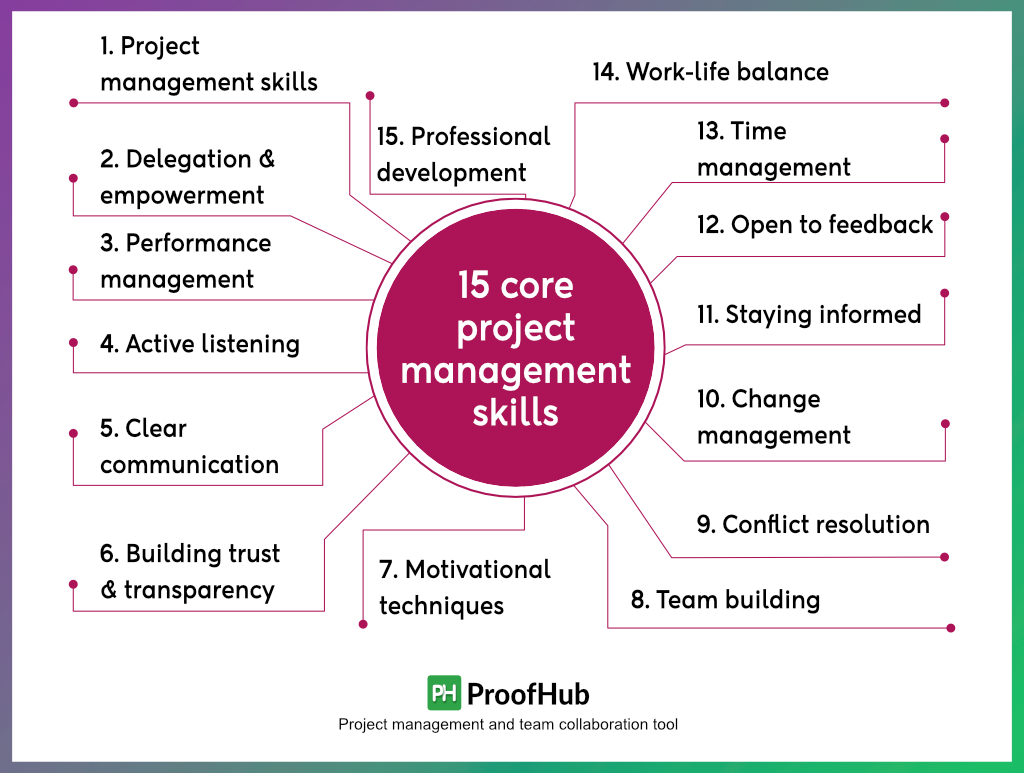
To keep your team motivated and productive, you must have a combination of skills mentioned below:
Mastering the fundamentals of management
1. Project management skills
One of the most important skills is you need to understand the different aspects of a project. This includes planning out what needs to be done, scheduling tasks, budgeting, and managing resources.
Why is this so important?
Well, without it, you may not deliver your projects on time, within budget, and to the quality standards required. But if you can master project management skills, you’ll be able to keep your team on track, avoid delays, and ensure that you’re delivering value to your stakeholders.
So how can you gain these skills?
There are many resources available, such as online courses, books, and mentorship from experienced project managers. You can also learn by doing – take on small projects to practice your skills and seek feedback from your senior managers.
2. Delegation & empowerment
“The first rule of management is delegation. Don’t try and do everything yourself because you can’t.” — Anthea Turner
You need to learn how to delegate tasks to your team members. This will help you distribute the workload, increase team productivity, and build trust among team members. When tasks are allocated effectively, team members feel valued and trusted, which leads to higher job satisfaction and motivation.
You can start by identifying team members’ strengths and assigning tasks accordingly. You also need to communicate clear expectations and provide the necessary resources and support for your team members to complete the tasks successfully.
Read more- A simple guide to effective task allocation in project management
3. Performance management
One essential skill for project managers is performance management. It involves setting clear expectations for team members, providing regular feedback, and conducting effective performance reviews.
Performance management helps you ensure that your team members are aware of what is expected of them and can perform their duties effectively. It also helps to build trust and positive relationships with team members, leading to higher job satisfaction and motivation. For this:
- Outline what you need from your team at the project kickoff
- Regularly provide both praise and constructive criticism to help them improve
- Use examples to show them what’s working well and what can be better
- Evaluate progress and offer opportunities for growth
Bring efficiency to your new project management role with ProofHub!
ProofHub is a comprehensive project management and team collaboration tool that offers you project management, task management, streamlining communication, custom reporting, and more- all in one place.
Here is how ProofHub can help you master the above skills:
- Project management skills: You need to have a clear understanding of the different stages a project goes through. This includes initiation, planning, execution, and closure.
ProofHub offers visual task tracking through different views including the Kanban board and Gantt chart that provide clarity throughout the project lifecycle. The drag-and-drop functionality makes it easy to plan and schedule tasks.
Moreover, you can keep your budget in check with the built-in reporting feature, which highlights potential roadblocks before they arise.
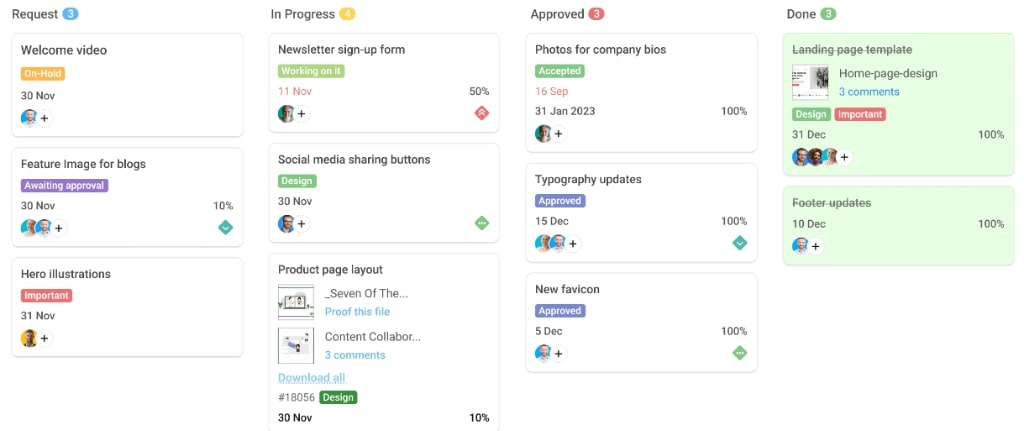
- Delegation & empowerment: With ProofHub, you can easily create and assign tasks based on what each member of your team is good at. This way, everyone feels more responsible for their work.
Plus, you can use discussion boards and task comments to communicate with your team and make sure everyone is on the same page.
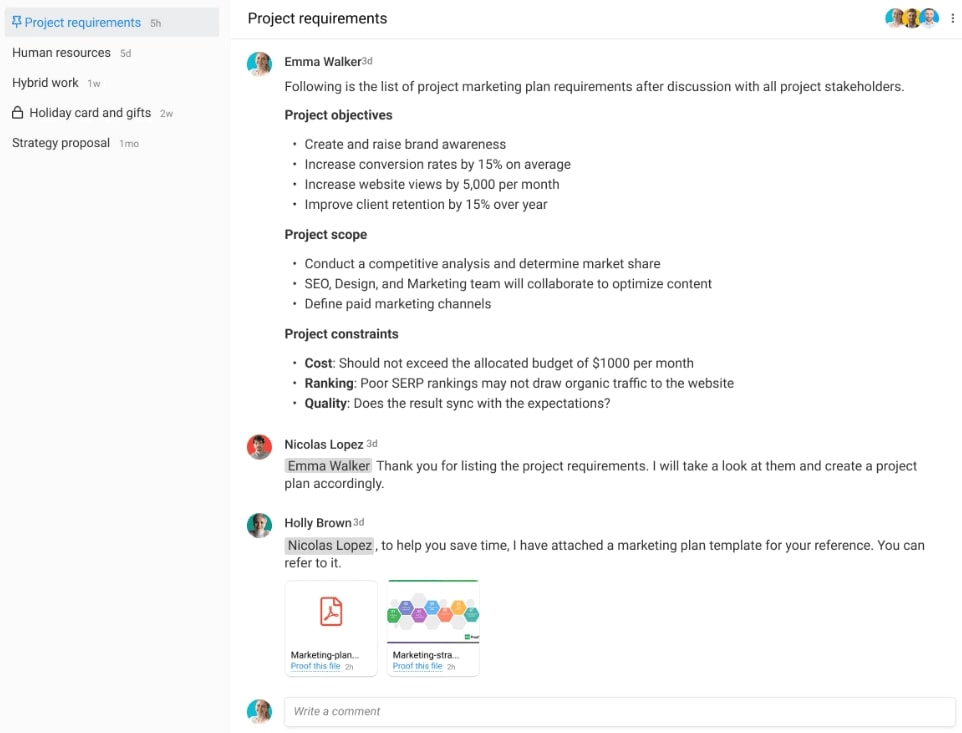
- Performance management: It’s important to set clear expectations right from the beginning. ProofHub allows you to do just that.
Moreover, with the help of task reports, you can keep track of the progress of your tasks and give specific feedback – all within a centralized platform. This encourages the continuous improvement and development of your team members.
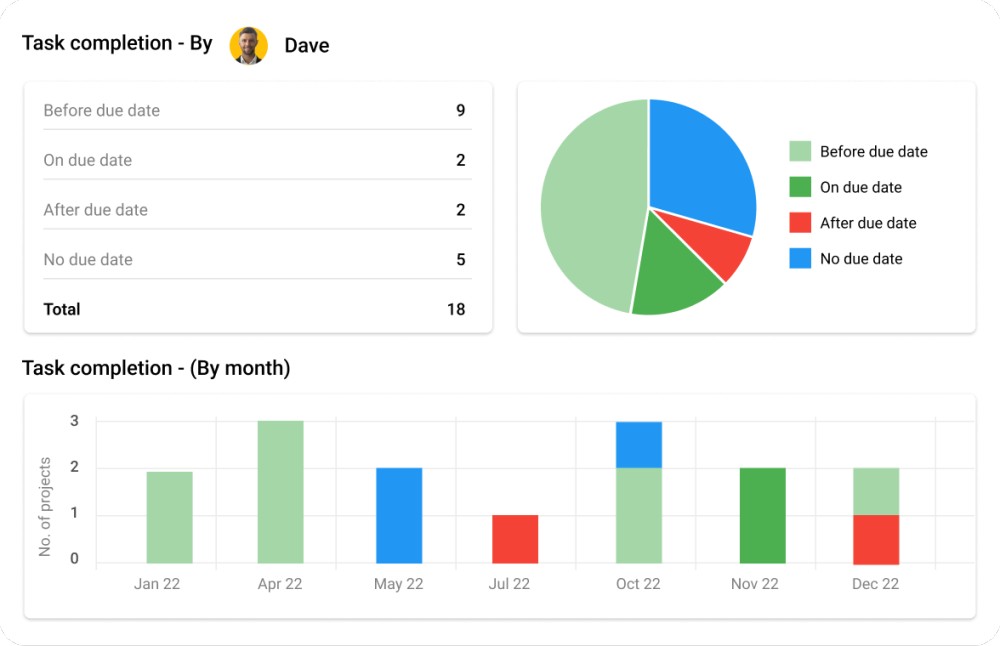
Communication & building relationships
4. Active listening
“Most people do not listen with the intent to understand; they listen with the intent to reply.” – Stephen Covey
Well, if you don’t listen to your team, you may miss critical information or misunderstand their needs. This can lead to miscommunication, delays, and even project failure.
Active listening lets you focus on what your team members are saying, understand their concerns, and take into account their perspectives.
You should pay attention to your team members, ask relevant questions to clarify any doubts and reflect on what they say.
5. Clear communication
If your team members are not fully aware of what is expected of them, misunderstandings can arise. Poor communication can lead to project delays, mistakes, and failure of projects.
However, clear communication can help you ensure that your project runs smoothly.
In fact, according to a study by the Harris Poll, 72% of leaders believe that effective communication has increased their team’s productivity.
So, you need to communicate in a way that is easy for your team members to understand. You can use different methods such as meetings, emails, or reports to communicate in a clear and concise manner based on the situation.
6. Building trust & transparency
“When trust goes up, speed will also go up and cost will go down” – Stephen M.R Covey
When your team trusts you, they are more likely to work effectively and efficiently. By building trust and transparency, you can create a positive work environment where everyone is comfortable sharing their ideas, opinions, and feedback.
To build trust, you can start by being open and honest with your team. Make sure that you communicate regularly and listen to their feedback.
You can encourage a culture of transparency by sharing information and progress updates with your team. This will help your team feel more involved in the project and give them a sense of ownership.
Leading & motivating teams
7. Motivational techniques
As a new project manager, it’s important to know how to motivate your team. You need to understand that everyone is different and has their own unique way of being motivated. You can use different motivational techniques to inspire and energize your team to do their best work.
You can start by getting to know your team. Find out what motivates each team member and what their strengths are. This will help you tailor your approach to each person. Some people are motivated by recognition, some by money, and some by having a sense of purpose.
“People are not lazy. They simply have impotent goals — that is, goals that do not inspire them.” – Tony Robbins
Therefore, you should also set clear and inspiring goals for your team. This will give them a sense of purpose and motivate them to work towards achieving those goals.
8. Team building
“The strength of the team is each individual member. The strength of each member is the team.” – Phil Jackson
That’s why, you need to build a strong and collaborative team. Team building activities can help you strengthen relationships and improve collaboration among team members.
You can start by organizing team-building activities that everyone in your team can participate in. These activities can include anything from team lunches to outdoor activities or games. These activities are great opportunities to break down barriers and help your team members get to know each other better.
Team building can take time and effort. But in the end, a strong and collaborative team can ensure that your project is successful and help everyone feel valued and respected.
9. Conflict resolution
Workplace conflict costs US companies $359 billion each year in lost productivity.
That’s a huge amount of money! other than productivity, conflicts also lead to disagreements, stress, low morale, and a toxic work environment.
So, you need to address the conflicts positively and work towards solutions that benefit everyone involved.
You can actively listen to all parties involved, acknowledge their perspectives, and work together to find common ground. You need to approach conflicts with an open mind and a willingness to collaborate.
By doing so, you can build better relationships with your team members, improve communication, and ultimately increase productivity.
Also read – Discover seven big project management conflicts & ways to solve them
Adaptability & continuous learning
10. Change management
“Change is inevitable. Growth is optional.” – John C. Maxwell
As a new project manager, you will undoubtedly face changes in your organization that can affect your team’s work and productivity. These changes can lead to confusion, frustration, and resistance from your team members.
You need to embrace these changes and guide your team through them with clear communication and support. By doing so, you can help your team adapt to new processes, systems, or policies, and help them see the benefits of these changes.
So, communicate with your team members regularly and clearly about the changes and what they can expect. Be available to answer questions and provide support along the way.
With patience, empathy, and a positive attitude, you can help guide your team through organizational changes and come out stronger on the other side.
11. Staying Informed
“Formal education will make you a living; self-education will make you a fortune.” – Jim Rohn
Therefore, you need to stay informed about the latest industry trends, new technologies, and management best practices. This will help you make informed decisions that can benefit your team and organization.
Without it, you risk making decisions based on outdated information or missing important developments that could impact your projects.
You can start by reading industry publications, attending webinars or conferences, and networking with other professionals in your field. Follow thought leaders on social media platforms and join online communities relevant to your industry.
You can also encourage your team members to share their knowledge and ideas and foster a culture of continuous learning and improvement.
12. Open to feedback
“I think it’s very important to have a feedback loop, where you’re constantly thinking about what you’ve done and how you could be doing it better.” – Elon Musk
Being open to feedback can help you continuously improve your work and leadership style. This means being receptive to feedback from your team, and superiors, and engaging in self-reflection.
To get feedback, you can create a culture of open communication within your team. Encourage your team members to share their thoughts and ideas, and be receptive to their feedback.
You can also seek feedback from your superiors by scheduling regular check-ins or performance reviews. Additionally, engage in self-reflection by taking time to evaluate your own performance and identify areas for improvement.
Personal & professional development
13. Time management
“Focus on being productive instead of busy.” – Tim Ferriss
As a project manager, mastering time management skills lets you prioritize your tasks, delegate effectively, and avoid burnout. Time management helps you make the most of your time, achieve your goals, and maintain a healthy work-life balance.
To manage your time effectively create a to-do list and prioritize tasks based on their importance and urgency. You can delegate tasks to your team members whenever possible, and ask for help when needed. Avoid multitasking and focus on one task at a time to maximize your productivity.
You can also use tools and techniques like time blocking, the Pomodoro technique, or the Eisenhower matrix to manage your time more efficiently. These methods can help you stay focused and avoid distractions.
14. Work-life balance
As a project manager, you may feel stressed out between managing multiple projects and your personal life. However, maintaining a good work-life balance is essential for your brain’s well-being.
Studies show that constantly being stressed can harm your brain’s performance. Taking breaks can make you sharper, calmer, and better at handling project chaos.
So, how can you achieve a work-life balance? Here are a few tips for you:
- Schedule your personal time, just like you would schedule a client meeting. Block out time in your calendar for activities like gym sessions or movie nights and treat them as important as work meetings.
- Learn to say “no.” If your plate is full, it’s okay if you politely decline some extra work. Your sanity (and sleep) will thank you.
- Leave work at work. Avoid checking emails after work hours, unless it’s an emergency. Your brain needs time to recharge for peak performance the next day.
15. Professional development
Project management is like driving a car. It may be exciting, but without proper training, it can be a bumpy ride.
Professional development is essential for success, as it equips project managers with the necessary skills. It lets you manage challenges, communicate effectively with the team, and meet deadlines.
So, here are a few ideas to get you started:
- Online courses offer a range of project management options, from quick lessons to in-depth certifications.
- Workshops provide a focused learning experience with hands-on activities and expert guidance.
- Mentorship is an excellent opportunity to learn from experienced project managers who can offer valuable insights and guide you through the ups and downs of project management.
What should a project manager be aware of?
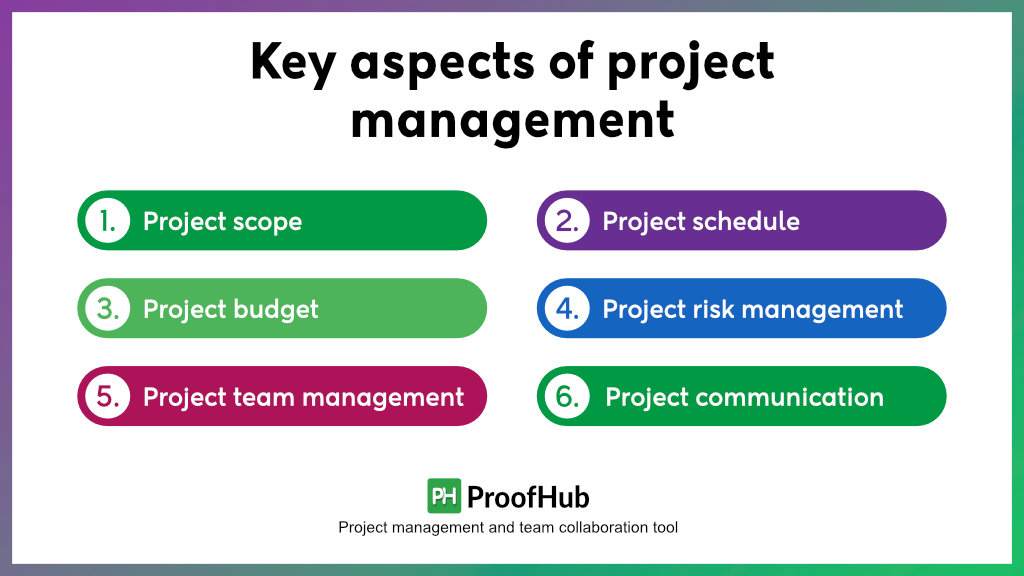
As a project manager, you need to be aware of several key aspects when managing a project. Here are some of them:
- Project scope: You should have a clear understanding of the project scope, including the objectives, deliverables, and requirements. This will help you ensure that your project stays on track and meets the needs of the stakeholders.
- Project schedule: Project managers should have a detailed project schedule that outlines all the tasks, project dependencies, milestones, and deadlines that they need to meet. This will help you ensure that your project stays on schedule and is completed on time.
- Project budget: You need to have a comprehensive project budget that outlines all the costs associated with your project. This will help you stay within budget and don’t spend more than you need to.
- Project risk management: You need to have a plan in place for identifying and managing any risks associated with your project. This will help you minimize the impact of any potential problems and keep your project on track.
- Project team management: You need to manage your team effectively so that they can work better without any conflicts. You can do so by setting clear roles and responsibilities for your team members, and providing support and resources as needed.
- Project communication: Project managers should have a plan for managing communication with project stakeholders. This includes providing regular updates and addressing any concerns or issues that arise.
What are the 5 key roles of a project manager?
A project manager is the captain of a ship and your team relies on you for a smooth ride. And, you will have to play different roles that are essential to the success of your project.
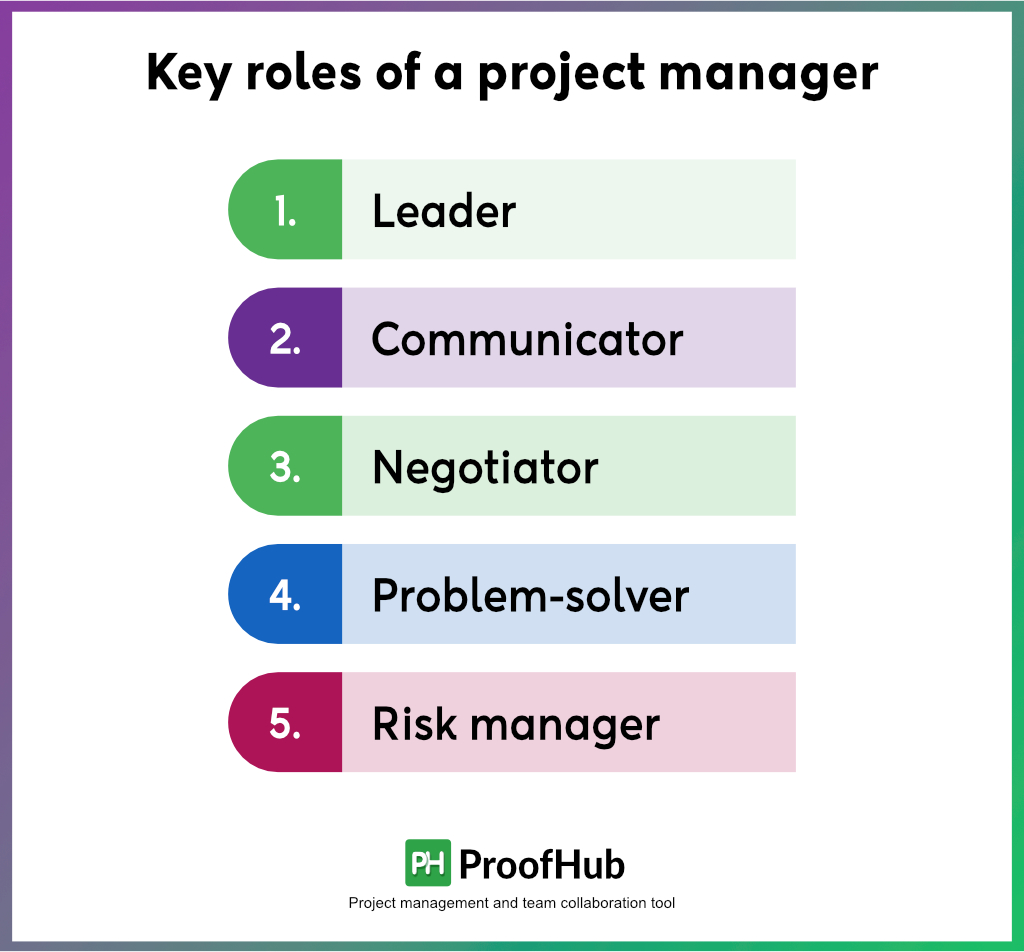
Here are the five key project manager roles:
- Leader: You will be the one who motivates and guides your team to work together for a common goal. It’s important to recognize and appreciate the team’s achievements along the way to keep them motivated.
- Communicator: You need to make sure that everyone is on the same page and that information is flowing smoothly between the team members and stakeholders. Clear communication is crucial to avoid any confusion or misunderstandings.
- Negotiator: Conflicts can arise during a project, and it’s your job to resolve them by finding a win-win solution for everyone. Being a good negotiator will help you to keep your team and stakeholders on board.
- Problem-solver: Every project has its own set of challenges, and you need to be ready to anticipate and overcome them with creative solutions. You should have a positive attitude and be resourceful to tackle any problem.
- Risk manager: You need to be proactive in identifying potential risks that could derail your project. It’s your job to mitigate these risks and keep your project on track. You should be able to identify risks before they turn into bigger problems.
4 Essential tools & techniques for new PMs
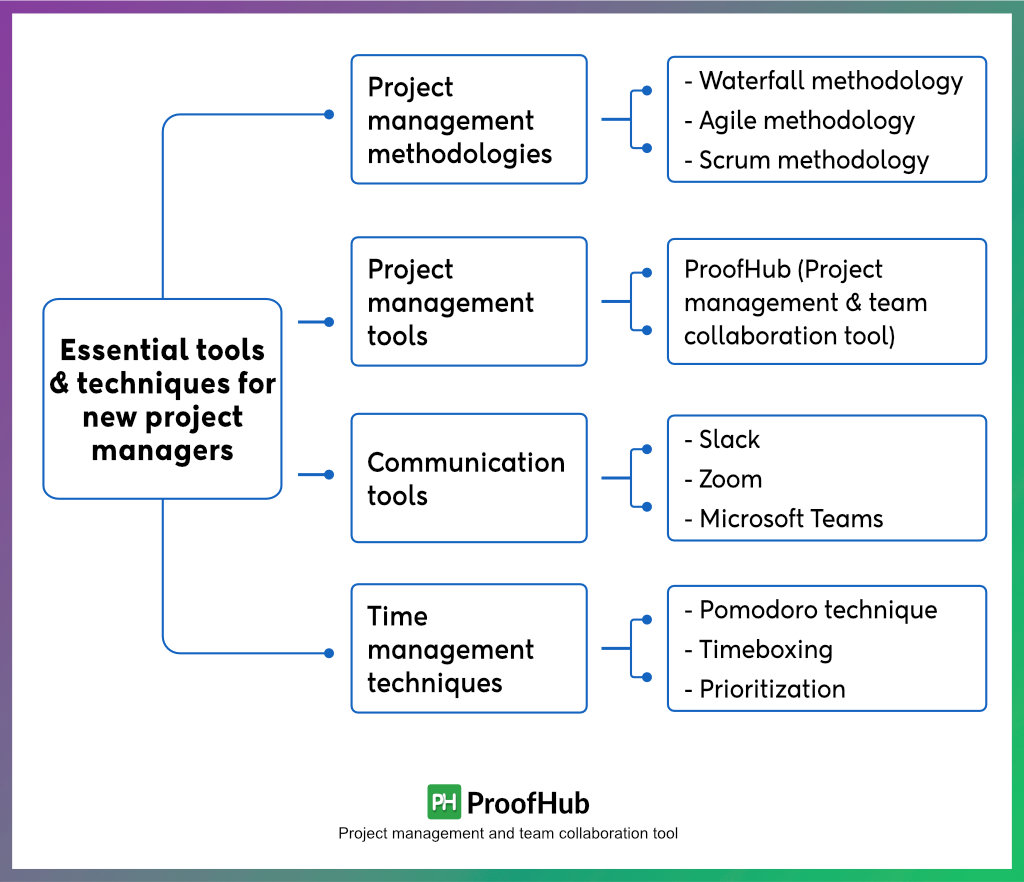
As a new project manager, you should know about some essential tools and techniques that can make your job much easier:
1. Project management methodologies
Project management methodologies are used to plan, execute, and control a project from start to finish. These methodologies can help you organize and manage your projects in a structured and efficient way, which can lead to better outcomes.
Although there are various methodologies available, here are some popular of them:
- Waterfall methodology: It is a traditional approach that follows a linear sequence of steps where each stage must be completed before moving on to the next. It provides a clear structure and timeline for the project, making it easier to plan and manage.
- Agile methodology: It is a flexible approach that focuses on delivering the project in small increments and adapting to changes as they arise. It is best suited for projects where the requirements are not well-defined and need to be adapted as the project progresses.
- Scrum methodology: It is a subset of Agile that is used for managing complex software development projects. In this methodology, you break down the project into small sprints and have daily meetings to track progress and address any issues that arise.
To determine the best methodology for your project, consider your project’s complexity, size, and timeline, as well as the resources available. You can also seek advice from experienced project managers and team members to help you make an informed decision.
2. Project management tools
As a project manager, you need to manage multiple tasks and projects all at the same time. This can be stressful and overwhelming. However, a project management tool can help you stay organized and on top of things.
A project management tool like ProofHub can help you keep track of all the aspects of your project, from timelines and budgets to team communication and file sharing. By using one, you can save time and be more effective in your role.
ProofHub can help you manage everything from tasks and workflows to team collaboration and time tracking. It is easy to use and has a user-friendly interface, making it perfect for new project managers.
With ProofHub, you can create task lists, assign tasks to team members, and track progress in real-time. You can also set deadlines, share files, and communicate with your team through built-in chat and comments.
Moreover, ProofHub lets you track your team’s time spent on tasks and generate reports to help you stay on top of project progress.
3. Communication tools
One of the most important parts of being a project manager is staying in touch with your team and stakeholders. However, this can be challenging. And if your team is working remotely or is spread out, it can turn into a complete disaster.
That’s where communication tools come in. Using these tools, you can quickly get updates, collaborate with others, and avoid misunderstandings.
Here are some popular communication tools:
- Slack: A messaging platform that lets you communicate with your team in real time. You can create channels for specific topics, share files, and even integrate other tools like ProofHub.
- Zoom: A video conferencing tool to conduct virtual meetings with your team members and stakeholders. You can share your screen, record the meeting, and even conduct polls. It’s perfect for remote teams and can save you time and money on travel expenses.
- Microsoft Teams: It helps you collaborate with your team effectively. It integrates with Office 365, allowing you to access files, emails, and calendars from one place. You can also create channels for different projects, chat with your team, and even conduct video meetings.
Read more- Best internal communication tools & software to boost collaboration
4. Time management techniques
As a project manager, you are going to have a lot on your plate. You need to manage your time effectively to stay on track and meet your deadlines.
To do so, you can use time management techniques. These techniques help you stay organized, focused, and productive.
Here are some helpful techniques to manage your time effectively:
- Timeboxing: Set a specific amount of time for each task and stick to that time limit. This will help you avoid getting bogged down in one task and ensure that you have time for everything on your to-do list.
- Prioritization: Rank your tasks in order of importance and tackle the most critical tasks first. By focusing on the most important tasks, you can ensure that you’re making progress on the most essential aspects of your project.
- The Pomodoro technique: Break your workday into 25-minute intervals, or “Pomodoros,” with short breaks in between. By working in short bursts, you can stay focused and avoid burnout.
By using these techniques, you can stay organized and make sure you’re making progress on your project every day.
10 practical tips for new project managers
Mastering project management skills helps you ensure everyone on your project team works together to get things done efficiently and reach the common goal.
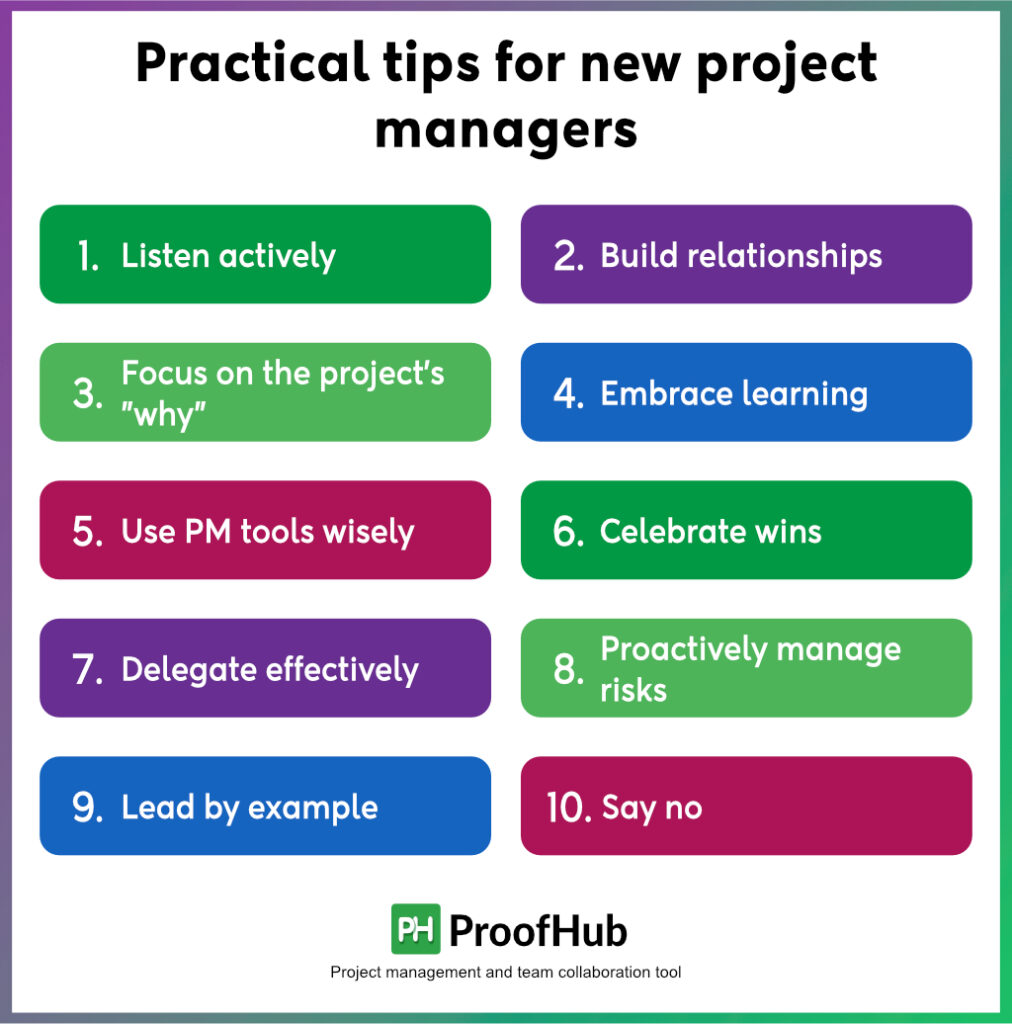
Here are some practical tips to facilitate effective project management:
- Listen actively before diving into project management plans. This will help you gain a better understanding of your team’s needs, concerns, and goals.
- Build relationships with your team members and understand their strengths. By doing so, you can assign tasks to your team more effectively and build trust among them.
- Focus on the project’s “why”, not just deliverables. This will help you stay aligned with the project’s goals and objectives. You can prioritize your tasks, make informed decisions, and ensure that the project is on track to meet its goals.
- Embrace learning and seek out mentorship. Continuous learning lets you grow as a project manager and gain valuable insights from experienced professionals.
- Use project management tools wisely – You need to use the most relevant tools that fulfill your needs. You can adjust your approach if necessary, and ensure team members are trained on the tools.
- Celebrate wins to keep your team motivated and engaged. You can recognize your team member’s achievements publicly, or organize a team outing or lunch. This will help you create a positive work culture and boost your team morale.
- Delegate effectively to empower your team members. You need to assign a task to the right team member who has the necessary skills and expertise to complete that task.
- Proactively manage risks to avoid surprises and delays. By identifying potential problems early on, you can come up with contingency plans to mitigate those risks.
- Lead by example with a positive and dedicated attitude. This will inspire your team members to do the same. Moreover, you can create a positive work environment where everyone feels good and is happy to be there.
- Say no to unrealistic demands to protect your project. And, you can avoid wasting your team’s time and resources. You need to set realistic expectations and communicate clearly with stakeholders to avoid any misunderstandings.
Conclusion
By now, we’ve journeyed through the things every new project manager needs to know. I am sure you must have gained some confidence in your abilities.
You may also find the whole process overwhelming. Remember, nobody becomes a pro overnight. It’s your job to learn and grow as you gain experience.
Lastly, consider ProofHub as your ally when you aim for success in your career.
FAQs
What is the first thing a project manager should do when starting a project?
The first thing a project manager should do when starting a project is to define the project scope and objectives clearly. This includes identifying the project goals, deliverables, timeline, budget, and stakeholders.
What could be a project manager’s checklist for project management?
Here are a few points a project manager can add to their checklist for project management:
- Define the project scope and objectives.
- Create a project plan that outlines the tasks, resources, and milestones required to achieve the project objectives.
- Identify and manage risks, issues, and changes that may arise during the project.
- Monitor and report on project progress to stakeholders.
- Ensure the project is delivered on time, within budget, and meets the expected quality standards.
- Conduct a post-project review to identify areas for improvement and capture lessons learned for future projects.
What should I learn to become a good Project Manager?
To become a good project manager, you should learn about project planning, budgeting, scheduling, risk management, communication, leadership, and team management.
You also need to develop problem-solving, decision-making, and organizational skills. You need to be adaptable to changing circumstances and priorities. Plus, you need to have a good understanding of the industry or field you work in.
What are the top 3 skills a project manager needs to succeed?
The top three skills a project manager needs are communication, leadership, and problem-solving.
- Good communication skills help you convey your ideas and understand your team members.
- Leadership skills help you motivate and guide your team members toward success.
- Problem-solving skills help you identify and solve issues or conflicts that may arise during the project.
What are some basics a project manager should always remember?
As a project manager, you should always remember to plan the project thoroughly and communicate regularly with the team. You should monitor progress frequently, be flexible and adaptable, and always keep the project goals and objectives in mind.
You should also maintain a positive attitude, be approachable, and build strong relationships with your team members and stakeholders alike.

